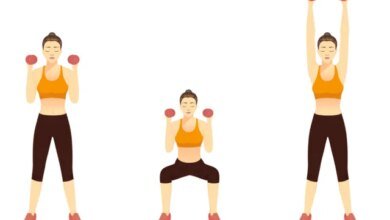Skipping for Weight Loss – Easy Way to Lose Weight

Skipping is a high-intensity cardiovascular exercise that can help you lose weight. You can do this simple yet effective workout anywhere. Skipping is a convenient choice for busy individuals. It is a terrific aerobic workout for weight loss.
Research shows that skipping can help you burn as many calories as running.
Skipping for Weight Loss – The Connection
Skipping can be a good exercise for weight loss because it is a high-intensity cardiovascular activity. It can help you burn a significant number of calories in a short amount of time.
Skipping is also a convenient exercise you can perform almost anywhere. By constantly jumping and switching directions, skipping helps to tone the muscles in your lower body, including your calves, quads, and glutes. It also helps to strengthen your core and improves your balance.
It is essential to note that weight loss is a function of the balance between the number of calories you burn through physical activity and the number of calories you consume through your diet.
Therefore, to maximise weight loss, it is crucial to also focus on your nutrition and maintain a calorie deficit. Also, incorporating different exercises into your routine is essential to challenge your body and avoid plateaus.
Benefits of Skipping Rope for Weight Loss
Calorie-burning Effect
One of the significant benefits of skipping for weight loss is the high number of calories you burn quickly. During a skipping workout, your body is constantly in motion. Therefore, it helps to boost your metabolism and increase calorie expenditure.
According to a study, a 150-pound (68kg) individual performing a 10-minute skipping session and a 30-minute jog at similar intensities can burn the same number of calories. It indicates that skipping is a time-efficient exercise for weight loss.
High-Intensity Cardio Exercise
Skipping is a high-intensity cardiovascular exercise which can help improve your overall fitness level by increasing your endurance. It also strengthens your heart and lungs. Skipping gets your heart rate up and helps to improve your cardiovascular endurance.
Studies have suggested that high-energy exercises can improve overall health and lower the risk of heart disease. Additionally, skipping is an excellent way to get a good cardiovascular workout, essential for maintaining a healthy weight and avoiding weight gain.
Strengthens Muscles
According to research, skipping helps tone and strengthen your lower body’s muscles, including calves, quads, and glutes. These muscles are constantly engaged and working as you jump and switch directions.
As a result, it increases muscle definition and strength. In addition to toning your lower body, skipping can also help to improve your balance and coordination.
Convenient
One of the enormous benefits of skipping is that it is a convenient exercise choice for busy individuals. All you need is a skipping rope, which is easy to pack and take.
Whether at home, a park, field or gym you can find a place to skip and fit it into your daily routine. This flexibility makes it easier to stick to your workout plan and achieve weight loss goals.
The HealthifyMe Note
Skipping, also known as jump rope, can be a good exercise for weight loss. It is a high-intensity cardiovascular activity that can burn many calories quickly. Additionally, skipping can improve coordination, balance, and agility. You can do it almost anywhere with minimal equipment.
It is necessary to create an overall calorie deficit by burning more calories than you consume through diet and exercise. Skipping can be a part of a comprehensive weight loss plan. Still, it would help if you combined it with a healthy diet and other forms of physical activity for the best results.
Precautions
According to studies, warming up is crucial before starting any workout regime. Listen to your body and rest when needed. You can also incorporate different skipping rope exercises into your routine to challenge your body and keep things interesting. Some examples of skipping rope exercises for weight loss include basic skip, side-to-side skip, high knees, cross-overs, double under, jumping jacks, alternating leg skip, boxer skip, and mountain climbers.
HealthifyPRO Tip
Before starting any new exercise program, it is crucial to consider your physical abilities and any existing health conditions. If you are not used to vigorous physical activities, start slowly and gradually increase your workout intensity. It is also essential to use proper form and technique when skipping to minimise the risk of injury.
Conclusion
Skipping is a flexible and powerful exercise for losing weight. It tones your lower body, boosts your balance, and enhances your coordination.
In addition, it increases your heart rate and burns a ton of calories. There is a skipping workout regimen for everyone, regardless of experience level. The best part is that you need a skipping rope and a little room to start.
Frequently Asked Questions (FAQs)
Q. How many skips a day for weight loss?
A: The number of skips per day you need to do to lose weight will depend on various factors, including your age, gender, weight, and activity level. Generally, you must engage in at least 150 minutes of moderate-intensity cardiovascular activity per week. Or perform 75 minutes of vigorous-intensity activity to lose weight. On the other hand, skipping can be a high-intensity activity. Thirty minutes per day could help you reach this goal.
Q. Can I lose belly fat by skipping?
A: Yes. Skipping is a cardiovascular exercise. When you perform any cardiovascular exercise, your body uses energy to fuel the activity. As a result, it can help reduce fat stores, including belly fat. To effectively reduce belly fat through skipping, engaging in an activity regularly and maintaining a healthy diet is vital. Skipping can also help to improve overall cardiovascular health, increase muscle strength and coordination, and boost bone density.
Q. Is 30 minutes of skipping enough to lose weight?
A: 30 minutes of skipping can be an effective way to lose weight. But it is important to note that the amount you lose will depend on various factors, including age, gender, weight, and activity level. Please engage in at least 150 minutes of moderate-intensity cardiovascular activity per week or 75 minutes of vigorous-intensity activity. Skipping can be a high-intensity activity, so 30 minutes per day can make you lose weight.
Q. How long should I skip rope to lose weight?
A: To lose weight, engage in at least 150 minutes of moderate-intensity cardio activity per week or at least 75 minutes of vigorous-intensity cardio activity. Skipping can be a fun and effective way. However, it would be best if you also focused on your diet. In addition, aim for more extended sessions to maximise the weight loss benefits of skipping. However, incorporate breaks to maintain proper form and avoid injury.
Q. What happens if I do 1000 skips every day?
A: If you do 1000 skips daily, you can expect to burn calories and improve your cardiovascular fitness. The number of calories burned while skipping depends on various factors. It includes your weight, age, and intensity level. Here is a rough estimate of the number of calories that a person might burn while skipping for 10 minutes:
- A person weighing 57 kg might burn about 50 calories
- A person weighing 70 kg might burn nearly 60 calories
- A person weighin84 kg might burn about 75 calories
Q. What are the disadvantages of skipping?
A: As per research, high-impact exercise can be stressful for joints. Skipping can put a lot of stress on your joints, mainly your ankles, knees, and hips. If you have any pre-existing joint problems, skipping may not be the best exercise for you. Skipping can also be hard on the wrists if you do not hold the rope correctly. It may not be suitable for people with hand or wrist injuries.
Q. Is skipping better than running?
A: It is inaccurate to say that skipping is definitively better than running or vice versa. Both activities have their unique benefits. Skipping is a high-intensity cardiovascular exercise. It can help to improve coordination, agility, and bone density. On the other hand, running can also help build endurance and muscle strength. The calorie burn can be the same. Ultimately, the best form of exercise is the one you enjoy and can stick with in the long term.
The Research Sources
1. Fountaine CJ, Schmidt BJ. Metabolic cost of rope training. J Strength Cond Res. 2015 Apr;29(4):889-93. doi: 10.1519/JSC.0b013e3182a35da8. PMID: 23897017.
Skipping for Weight Loss: Easy Way to Enhance Weight Losshttps://pubmed.ncbi.nlm.nih.gov/23897017/
2. Ainsworth BE, Haskell WL, Leon AS, Jacobs DR Jr, Montoye HJ, Sallis JF, Paffenbarger RS Jr. Compendium of physical activities: classification of energy costs of human physical activities. Med Sci Sports Exerc. 1993 Jan;25(1):71-80. Doi: 10.1249/00005768-199301000-00011. PMID: 8292105.
https://pubmed.ncbi.nlm.nih.gov/8292105/
3. Ito S. High-intensity interval training for health benefits and care of cardiac diseases – The key to an efficient exercise protocol. World J Cardiol. 2019 Jul 26;11(7):171-188. doi: 10.4330/wjc.v11.i7.171. PMID: 31565193; PMCID: PMC6763680.
https://www.ncbi.nlm.nih.gov/pmc/articles/PMC6763680/
4. Kirthika, Veena & .s, Sudhakar & Selvam, Senthil. (2019). The Effect of Skipping rope Exercise on Physical and Cardiovascular fitness among Collegiate Males. Research Journal of Pharmacy and Technology. 12. 4831-4835. 10.5958/0974-360X.2019.00836.9.
5. Park HK, Jung MK, Park E, Lee CY, Jee YS, Eun D, Cha JY, Yoo J. The effect of warm-ups with stretching on the isokinetic moments of collegiate men. J Exerc Rehabil. 2018 Feb 26;14(1):78-82. doi: 10.12965/jer.1835210.605. PMID: 29511656; PMCID: PMC5833972.
https://www.ncbi.nlm.nih.gov/pmc/articles/PMC5833972/
6. Messier SP, Mihalko SL, Beavers DP, et al. Effect of High-Intensity Strength Training on Knee Pain and Knee Joint Compressive Forces Among Adults With Knee Osteoarthritis: The START Randomized Clinical Trial. JAMA. 2021;325(7):646–657. doi:10.1001/jama.2021.0411




